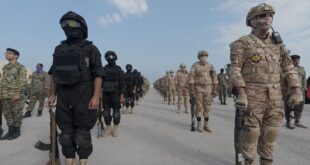Iranians voted Friday in a presidential election marked by a low turnout and a lack of formidable rivals to the candidacy of Iran’s ultraconservative judiciary chief Ebrahim Raisi.
There were no official estimates of the turnout from Iran’s Interior Ministry as polling stations closed at 2 a.m. Saturday local time. Authorities had extended Friday’s vote by two hours past the original midnight closing time in the hope of seeing more voters make it to the polls.
Earlier, Iran’s semi-official Fars news agency reported that 37% of the country’s 59 million eligible voters had cast ballots by 7:30 p.m. local time. There was no confirmation of that tally from the Interior Ministry, which was managing the election.
Analysts said much of Iran’s electorate appeared disenchanted with their Islamist rulers for mismanaging an economy ravaged by U.S. sanctions, a prolonged pandemic and official corruption.
Iranian state-approved pollsters had predicted before the election that the turnout percentage could end up in the low 40s, which would mark a record low for a presidential election since Iran’s 1979 Islamic Revolution, in which its ruling Shiite clerics seized power from a collapsing monarchy. The previous low turnout was 50% in 1993.
Social media posts from inside Iran also indicated that voting was light at polling stations around the country. Iranian state TV showed close-ups of voting lines at some sites as leading political figures implored people to vote. Among them were Supreme Leader Ayatollah Ali Khamenei, outgoing President Hassan Rouhani, who is ending an eight-year term, and leading presidential candidate Raisi, a Khamenei protege whom many Iranians expect to easily win the race.
Iran’s Guardian Council, the constitutional watchdog tasked with approving candidates, allowed only Raisi and six other lesser-known Khamenei loyalists to run in the election, barring hundreds of other presidential hopefuls, including several politicians who have prominent public profiles comparable to Raisi’s. The disqualifications sparked a weekslong campaign by Khamenei’s Iranian critics inside and outside the country to encourage a boycott of what they described as a sham election.
“I believe the low turnout will lead to a worsening crisis of legitimacy for the Iranian regime,” said Ladan Boroumand, a director of U.S.-based rights group Abdorrahman Boroumand Center, in a VOA Persian TV interview on Friday. “That is why the ruling system has always put emphasis on voter participation and used all possible means to bring people to the polls.”
Elahe Boghrat, chief editor of Iranian diaspora news site Kayhan London, told VOA Persian that many Iranians voted with their feet by staying away from the ballot boxes. “This stance is a big no to the Islamic republic,” she said.
Three of the seven approved presidential candidates withdrew from the contest on Wednesday, two of them ultraconservatives like Raisi and one a relative moderate. The narrowed field made Friday’s election a contest between Raisi, two other ultraconservatives and one relative moderate, former central bank chief Abdolnasser Hemmati.
If none of them wins an outright majority, a runoff election would be held one week later. Results from Friday’s vote were expected to be released on Saturday at midday local time.
Raisi, who campaigned on a pledge to fight corruption, would be the first Iranian president to take office while under U.S. sanctions if he wins. Washington has sanctioned Raisi for alleged involvement in Iran’s mass executions of political prisoners in the late 1980s.
Khamenei in charge
Regardless of who wins, Khamenei remains Iran’s ultimate decision-maker in matters of foreign and nuclear policy. All the approved presidential candidates backed his decision to engage in indirect talks with the U.S. in Vienna in recent months in the hope of reaching a deal for an easing of U.S. sanctions on the Iranian economy.
President Joe Biden’s administration has said it could ease the sanctions if Iran agreed to resume curbs on nuclear activities that could be weaponized. Tehran accepted those limits in return for relief from international sanctions as part of a 2015 nuclear deal with world powers, known as the Joint Comprehensive Plan of Action. But Iran began violating the nuclear curbs in 2019 in retaliation for then-President Donald Trump’s decision the previous year to withdraw from the JCPOA and unilaterally tighten U.S. sanctions.
Trump said the JCPOA did not do enough to prevent Iran from developing nuclear weapons – a goal it denies having – or engaging in other objectionable activities. Biden has said a mutual U.S. and Iranian return to JCPOA compliance would be a precursor to a U.S. effort to negotiate a stronger and longer agreement addressing other issues.
Farhad Rezaei, an Iranian politics professor at Canada’s York University, told VOA Persian TV in another Friday interview that an election victory for Raisi, a more conservative figure than the outgoing Rouhani, could make it tougher for Biden to persuade Iran to reach a follow-up agreement to the JCPOA.
“But because Iran’s foreign policy, especially relating to the U.S., is the exclusive domain of Khamenei, whoever becomes the next president is likely to follow the same long-established rules,” Rezaei said.
The next Iranian president, who can serve a maximum of two four-year terms, also could be a contender to replace Khamenei, 82. Khamenei served as Iranian president himself before being appointed supreme leader in 1989.
Khamenei hopes a victorious Raisi will help clean up some of the systemic corruption in Iran’s power structures, said Prague-based Iranian journalist Behnam Gholipour, speaking to VOA Persian.
“If Khamenei deems Raisi a success, I think he will propose Raisi to succeed him.”
 Eurasia Press & News
Eurasia Press & News



